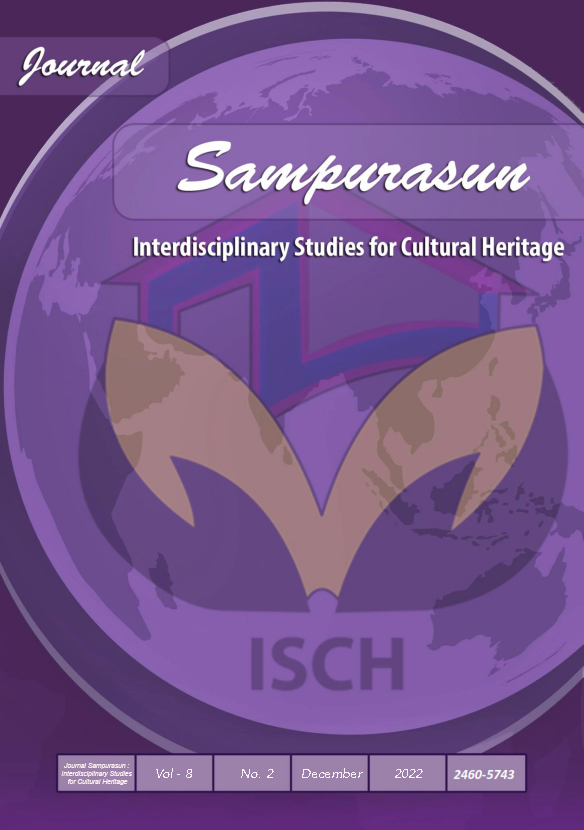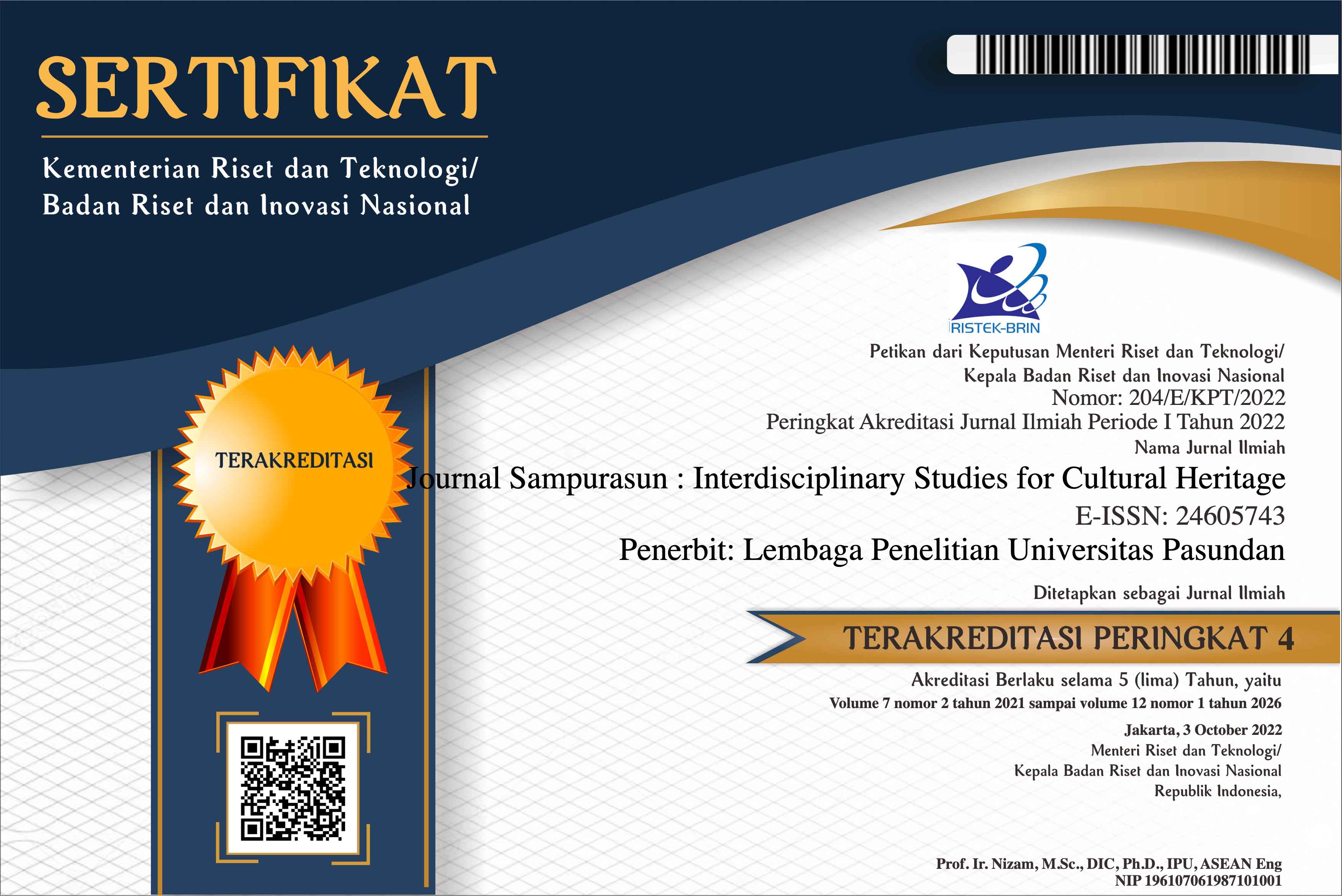VOCATIVE USE OF PEOPLE'S NAMES AND FAMILY RELATIONSHIPS IN SUNDANESE CONVERSATION IN THREE INTERNET SITES IN 2022
DOI:
https://doi.org/10.23969/sampurasun.v8i2.6261Keywords:
vocative; universality of languages; sociolinguistics; social relations; codeAbstract
Sundanese is a local language spoken by ethnic Sundanese Indonesian. Like any other language in the world, Sundanese also has language devices called vocatives to call addresses by speakers in a conversation. This paper explains the vocative, including the forms, which are the level of speech to show the social relations between speakers and addresses. The method used to collect the data is an observation method. The data analysis used is a distributional method with a sociolinguistic approach. From twenty-six data, there are sixteen people-name vocatives and ten family-relation vocatives. Of the sixteen people-name vocatives, six vocatives are in full-nickname form, namely Giri (1), Gilang (1), Lia (3), and Ani (1); and ten vocatives are in partial-nickname form, namely Lang (2) Nit (2), Tir (4), and Put (4). Meanwhile, ten family-relation vocatives consist of nine partial Sundanese-honorific forms, namely Kang (6), Neng (2), and Ceu (1), and one complete Sundanese-honorific form, namely Si Aa. Furthermore, from sixteen people-name vocatives, thirteen vocatives are used to show respect to others and three others to show familiar code. Meanwhile, all the family-relation vocatives are used to respect others. Hence, people-name vocatives are used to maintain social relationships on friendships. Meanwhile, family-relation vocatives are used to create new friendships.
Downloads
References
Bloomfield, L. (1995). Language (1st ed.). Gramedia Pustaka Utama.
Hadi, A., Wikaja, A., Saleh, R., Sudirman, E., Faturohman, T., Tamsyah, B. R., & Koraliati, A. (1991). Peperenian (Kandaga, Unak-Anik, Rusiah Basa Sunda) (1st ed.). Geger Sunten.
Kats, J., & Soeriadiradja, M. (1982). Tata Bahasa dan Ungkapan Bahasa Sunda. Djambatan.
Lyons, J. (1977). Semantics (1st ed.).
Quirk, R., & Greenbaum, S. (1983). A University Grammar of English (4th ed.). Longman.
Rahardi, R. K. (2010). Kajian Sosiolinguistik.
Richards, J., Platt, J., & Weber, H. (1987). Longman Dictionary of Aplied Linguistics.
S., Coolsma. (1985). Tata Bahasa Sunda (1st ed.). Djambatan.
Sudaryat, Y., Prawirasumantri, A., & Yudibrata, K. (2013). Tata Basa Sunda Kiwari. Yrama Widya.
Tamsyah, B. R. (2015). Kamus Undak Usuk Basa Sunda (10th ed.). Geger Sunten.
Wahya, & Hazbini. (2020). LEXICON BORROWINGS FROM ARABIC IN SUNDANESE SPEECH LEVEL SYSTEM. Humanities & Social Sciences Reviews. https://doi.org/10.18510/hssr.2020.8395
Wahya, Wahya. (2019). Proceeding 7th Annual Internasional Conference on Linguistics Setali 2019 The Existence of Language in The Industrial Revolution Era 4.0 (A. D. Bachari, F. Aulawy, M. A. Putri, M. F. J. Sudding, & N. Usman (eds.); pp. 1009--1016).
Wahya, Wahya, Lyra, H. M., & Permadi, R. Y. (2020). Fatis Bahasa Sunda dalam Perspektif Sosiolinguistik (T. Ampera (ed.); 1st ed.). Unpad Press.
Downloads
Published
Issue
Section
License
Copyright (c) 2022 Journal Sampurasun : Interdisciplinary Studies for Cultural Heritage

This work is licensed under a Creative Commons Attribution 4.0 International License.
Copyright Notice
Authors should not withdraw their submitted papers because the withdrawal wastes voluntary works devoted by an associate editor and reviewers. But, we accept the withdrawal of a submitted paper if authors have unavoidable reasons. In the event that a manuscript is to be withdrawn from submission to Sampurasun Journal, a letter must be sent to the editorial office requesting withdrawal by e-mail (sampurasunjournal@unpas.ac.id) with its scanned PDF file, before the notification of acceptance for publication.
The withdraw request letter must include the following information. Paper ID, Paper title, Authors names, Reason why the paper must be withdrawn, and Date and signatures of all the authors (or signature of the contact author).
If only the contact author signs the letter, he/she must obtain the agreement of the withdrawal from all the other authors and the letter must include the description that all the other authors agreed the withdrawal. The journal will not withdraw a manuscript from peer review until such a letter has been received. Authors must not assume their manuscript has been withdrawn until they have received appropriate notification from the editorial office. Withdrawal of a manuscript subsequent to acceptance for publication will only be granted in the most exceptional of circumstances.
After the paper is accepted for publication, the withdrawal is not permitted in principle. The authors must always pay the charge even if the withdrawal is permitted. Any request of withdrawal that does not follow the above procedure is treated as invalid. If illegal submission, e.g., plagiarized or duplicate submission, is found for a paper, the withdrawal of the paper will never be permitted and the authors will be punished based on the rule. It is not acceptable practice to withdraw a manuscript in the event of acceptance at another journal. This constitutes dual submission. The editorial office of the other journal will be notified of your actions. In such circumstances Sampurasun ISCH may chose to impose appropriate punitive action subject.
Withdrawal Penalty
Author is not allowed to withdraw submitted manuscripts, because the withdrawal is waste of valuable resources that editors and referees spent a great deal of time processing submitted manuscript, money and works invested by the publisher. If author still requests withdrawal of his/her manuscript when the manuscript is still in the peer-reviewing process, author will be punished with paying $200 per manuscript, as withdrawal penalty to the publisher. However, it is unethical to withdraw a submitted manuscript from one journal if accepted by another journal. The withdrawal of manuscript after the manuscript is accepted for publication, author will be punished by paying US$500 per manuscript. Withdrawal of manuscript is only allowed after withdrawal penalty has been fully paid to the Publisher. If author don't agree to pay the penalty, the author and his/her affiliation will be blacklisted for publication in this journal. Even, his/her previously published articles will be removed from our online system.


















